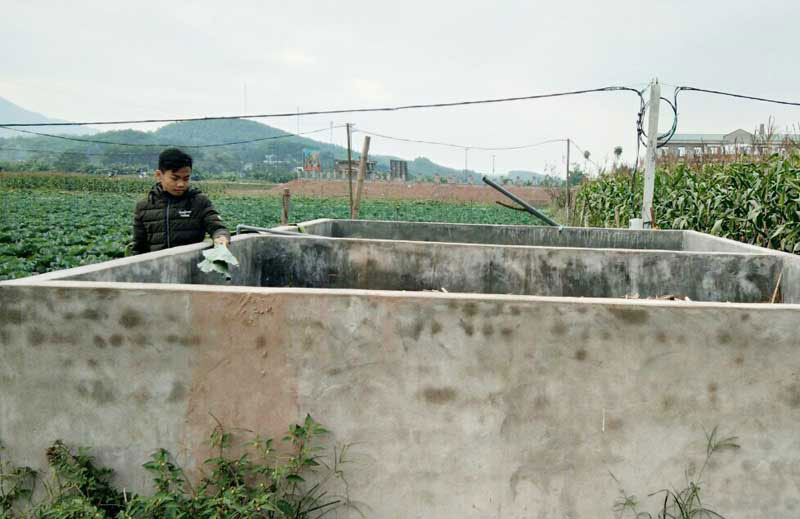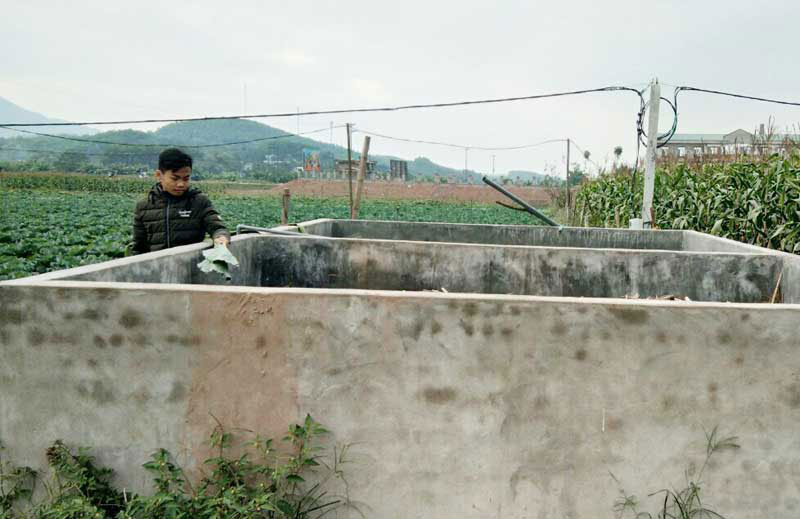
(HBO) – The agricultural commune of Yen Mong is one of the nine communes and wards of Hoa Binh city that haven’t had waste incinerators. Waste, mostly household garbage and agricultural by-products, was dumped in landfills, leading to pollution in surrounding areas. Facing that fact, the commune has piloted a waste-to-fertiliser model at local households in recent years.
A tank for composting waste
to make fertilizer in Yen Hoa 1 hamlet of Yen Mong commune (Hoa Binh city).
Since 2015, the communal Farmers Association has
coordinated with local authorities, sectors and organisations to encourage
households to dig 532 pits for waste treatment, initially helping to reduce the
waste volume that garbage collectors had to deal with.
The agricultural cooperative of Yen Mong commune
is farming 5,000 square metres of cabbage, French bean, tomato and kohlrabi
this season. It is also managing two waste composting tanks in Yen Hoa hamlet.
Nguyen Van Vin, Chairman of the Yen Mong Farmers
Association, said the commune has been chosen to pilot the sorting of home
garbage and production of fertilizer from organic waste at households in five
hamlets. The work also aims to raise locals’ awareness of environmental
protection and equip them with relevant knowledge and skills.
With the State’s financial support of 100
million VND (over 4,300 USD) and local residents’ help with construction work,
10 waste composting tanks have been built, serving over 50 households in five
hamlets, namely Yen Hoa 1, Yen Hoa 2, Khang Dinh, Moi Mit and My.
Each tank is about 12 cubic metres in size and
located far away from water resources to ensure environmental hygiene.
One hundred members of the Farmers Association
have also been trained in waste collection, sorting and treatment at
households, and equipped with knowledge about environmental protection in rural
areas.
The emulation movement "Hoa Binh joining hands to build new-style rural areas” has been widely spreading, becoming a driving force that motivates the localities to renew rural landscapes and improve the material and spiritual lives of the residents. In this movement, the people play a central role-both as the main implementers and direct beneficiaries of its outcomes.
In response to the global digital revolution, Hoa Binh Newspaper is transforming itself into a modern and multi-platform media hub, blending cutting-edge technology with a restructured newsroom and a new generation of tech-savvy journalists.
Hoa Binh province’s Association of the Elderly recently held a conference to review the project on expanding the inter-generation self-help club model until 2025.
In a move to implement Resolution No. 57-NQ/TW, issued on December 22, 2024 by the Politburo, which targets breakthroughs in science-technology development, innovation, and digital transformation, the Hoa Binh provincial Department of Health has issued a plan to roll out the "Digital Literacy for All” campaign within the local health sector.
An Nghia Commune (Lạc Sơn District) is one of the communes that achieved the tha standard of the national new rural area in 2018. Entering a new development phase, the commune is now trying to meet the criteria for the advanced new rural development. With the strong political will and the public consensus, the commune is gradually overcoming the challenges to reach this goal, aiming for the sustainable development.



